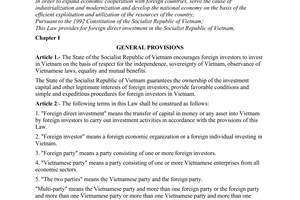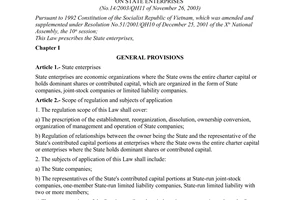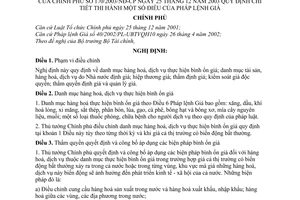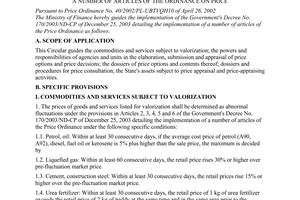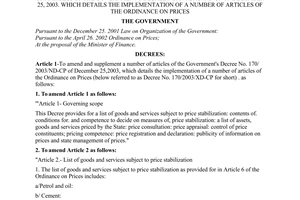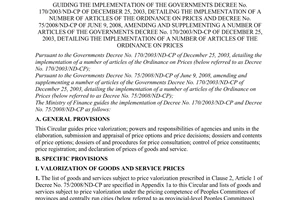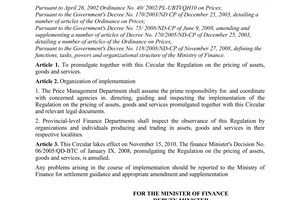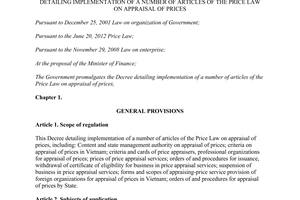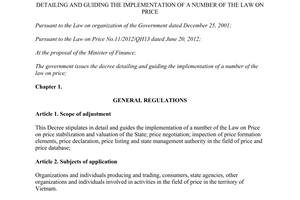Decree No. 170/2003/ND-CP detailing the implementationof the Ordinance on prices đã được thay thế bởi Decree No. 177/2013/ND-CP guiding the implementation of the Law on price và được áp dụng kể từ ngày 01/01/2014.
Nội dung toàn văn Decree No. 170/2003/ND-CP detailing the implementationof the Ordinance on prices
|
THE
GOVERNMENT |
THE
SOCIALIST REPUBLIC OF VIETNAM |
|
No.: 170/2003/ND-CP |
Hanoi , December 25, 2003 |
DECREE
OF THE GOVERNMENT No.170/2003/ND-CP DATED DECEMBER 25, 2003 DETAILING THE IMPLEMENTATION OF A NUMBER OF ARTICLES OF THE ORDINANCE ON PRICES
THE GOVERNMENT
Pursuant to the Governmental Organization dated December 25, 2001;
Pursuant to the Ordinance on Prices No.40/2002/PL-UBTVQH10 dated April 26, 2002;
At the request of the Minister of Finance,
DECREES:
Article 1. Scope of governing
This Decree provides for the list of goods and services subject to price stabilization; the list of assets, goods and services conducted valuation; price negotiation; and price appraisal, control of price monopoly; valuation competence and price management by the State.
Article 2. List of goods and services subject to price stabilization
1. List of goods subject to price stabilization by Article 6 of the Ordinance on Prices include: gasoline, oil, liquefied gas, cement, iron, steel, fertilizer, rice, coffee, cotton seed and cotton fibers, sugar cane as raw materials, salt, and some drugs for medical prevention and treatment for persons under the provisions of law.
2. The Prime Minister adjusts the list of goods and services subject to price stabilization prescribed in Clause 1 of this Article depending on each period and when the market prices fluctuate abnormally.
Article 3. The competence to decide and announce the application of measures to stabilize prices
1. The Prime Minister decides and announces the application of measures to stabilize prices for goods and services on the list subject to price stabilization in case market prices fluctuate abnormally in the whole country or in each region, the area in which these prices of goods and services influence affecting the economic – social development the whole country. Those measures are:
a) Adjustment of supply and demand of domestically-produced goods and exports, imports between the regions and localities in the country;
b) Buying or selling of national reserve goods;
c) Inventory control when signs of speculation appear;
d) Use of financial instruments, currencies as needed.
2. The Minister of Finance decides and announces the application of measures to stabilize prices in case market prices fluctuate abnormally in the whole country or in each region, the area for goods and services on the list subject to price stabilization in which these prices of goods and services influence affecting the economic – social development the whole country or in each region, the area. Those measures are:
a) Stipulation of maximum prices, minimum prices and price brackets;
b) Control of price constituents when there are signs of monopoly connection on prices or price raising speculation.
3. People's Committees of provinces and cities under central authority (hereinafter referred to as provincial-level People's Committee) decide and announce the application of measures to stabilize prices in case market prices fluctuate abnormally in the localities for goods and services on the list subject to price stabilization in which these prices of goods and services influence affecting the economic – social development in the localities. Those measures are:
a) Adjustment of demand and supply of goods to ensure production, consumption in the localities;
b) Application of fiscal measures, monetary as necessary to stabilize prices of goods and services under their jurisdiction and use of local budgets.
4. Where specific goods and services that the Prime Minister, Ministry of Finance has decided and announced the application of measures to stabilize prices, the provincial-level People's Committees implement those measures.
Article 4. The time limit of application of measures to stabilize prices
1. The time limit of application of measures to stabilize prices decided and announced by the Prime Minister, Minister of Finance, the provincial-level People's Committees only takes effect during the time that the market price fluctuates abnormally.
2. When the market price situation is back to normal, the competent authorities that decide and announce the application of price stabilization measures announce the termination of the application time limit of such measures to stabilize prices.
Article 5. Procedures to submit to the competent authorities that decide to apply the measures to stabilize prices
1. Ministry of Finance submits to the Prime Minister for deciding and announcing the implementation of measures to stabilize prices in case the market price has been unusually volatile in the whole country or each region or each area.
2. Price Management Department submits to the Minister of Finance for deciding and announcing the implementation of measures to stabilize prices under the jurisdiction of the Ministry of Finance in case the market price has been unusually volatile in the whole country or each region or each area.
3. Department of Finance submits to the provincial-level People's Committee for deciding and announcing the implementation of measures to stabilize prices in cases where market price has been unusually volatile in the locality.
4. Contents of the written submission to the Prime Minister, Minister of Finance, the provincial-level People's Committee for deciding the price stabilization measures include:
a) Status and causes of fluctuation in market prices of goods and services on the list of price stabilization;
b) The measures to stabilize prices of goods, services and time limit for application of measures to stabilize prices;
c) Conditions for the implementation of measures to stabilize prices;
d) Responsibilities of agencies and organizations to take measures to stabilize prices.
Article 6. Responsibility for implementation of decisions on measures to stabilize the prices of the competent authorities
1. The Finance Ministry is responsible for guiding the implementation of decisions of the Prime Minister on the application of measures to stabilize prices.
2. The ministries managing branches, sectors and provincial-level People's Committees are responsible for implementing the measures to stabilize prices as stipulated in the decision issued by the Prime Minister and the decision issued by the Minister of Finance.
3. Department of Finance is responsible for guiding the implementation of decisions of the provincial-level People's Committee on the application of measures to stabilize prices; the Departments managing branches, sectors and People's Committees of districts and towns and provincial cities are responsible for implementing the measures to stabilize prices assigned by the provincial-level People's Committees.
4. Organizations and individuals producing and trading goods and services on the list subject to price stabilization are responsible for implementing concerned measures of price stabilization that have been provided in the decisions issued by the Prime Minister, Minister of Finance, the provincial-level People's Committee.
Article 7. Assets, goods and services valued by the State
1. Assets, goods and services valued by the State under clause 1 of Article 7 of the Ordinance on prices include:
a) Land under the provisions of the Land Law;
b) Water surface, important natural resources in accordance with law provisions;
c) Assets of the State sold, leased not through forms of bidding, auction:
State-owned houses for rent or sale;
The national reserve goods;
State property is the infrastructure works to serve national interests, public interests;
Goods and services produced by order of the State.
d) Exclusive goods and services of the State:
Electricity;
Passenger transport services by aircraft of standard domestic routes;
Services of post, telecommunications: regular domestic mail weighing up to 20 grams, telephone subscribers and local telephone contact at home, domestic and international long distance telephone; local, inter-provincial international telecommunications circuit leasing and other services of post, telecommunications defined by the Prime Minister under the Ordinance on Post and Telecommunications.
đ) Goods and services which are important to the country and the people:
Gasoline, oil according to provisions of the Prime Minister;
Clean water for daily life;
Passenger transport by buses in the city, towns and industrial zones;
A number of essential drugs for medical prevention and treatment;
Subsidized goods, transport subsidies;
The Nhan Dan newspaper, the newspaper of offices of the Party of Vietnam Communist Party of the provinces and centrally-run cities.
2. Where it is necessary to adjust the list of assets, goods and services valued by the State specified in clause 1 of this Article, the Ministry of Finance submits to the Prime Minister for decision.
Article 8. Competence of valuation
1. Competence to valuate assets, goods and services valued by the State is defined as follows:
a) The Government shall decide:
Land price bracket;
Price bracket for lease water surface;
The price bracket or standard price of housing owned by the state to sell or lease;
b) The Prime Minister shall decide:
Sale price or lease price of State assets as infrastructure projects serving national interests, public interests not through the forms of bidding, auction;
Housing prices owned by the state for lease or sale to the resettled people, policy beneficiaries;
Standard electricity prices;
Charge or charge brackets for transport services of regular domestic mail weighing up to 20 grams; rates or rates bracket of telephone subscribers and local phone contacts at subscribers’ houses;
The Nhan Dan newspaper selling price.
c) The Minister of Finance shall decide:
Sale price or leasing price of State assets as infrastructure projects serving national interests, public interests not through the forms of bidding or auction as authorized by the Prime Minister;
Prices of national reserve goods and goods, services produced by order of the State not through the forms of bidding, auction;
Rates of carriage of passengers by aircraft of standard domestic routes;
Petrol, oil price in accordance with provisions of the Prime Minister;
Bracket of clean water for daily life;
Based on the Government's land price bracket to guide provincial-level People's Committees to decide on land prices;
Based on the price bracket of the water surface lease of government to guide the provincial People's Committees to decide on water surface rents;
Retail price bracket of some essential medicines for the medical prevention and treatment for human being.
d) The Minister of Industry based on the standard electricity price of the Prime Minister to decide the specific price for selling electricity to consumers in the national network;
đ) The Minister of Post and Telecommunications shall decide: domestic and international long distance phone rates bracket; local, inter-provincial, international telecommunications circuit leasing rates bracket; rates of other post, telecommunications services defined by the Ministry of Post and Telecommunications under regulations issued by the Prime Minister.
e) The provincial-level People's Committees shall decide:
Rates of carriage of passengers by bus in the city, towns and industrial zones;
Prices of selling newspapers of the Party of the Communist Party of Vietnam of provinces and cities under central authority;
Based on the standard price bracket of the Government, the Prime Minister, Ministers, and guidance of the Ministry of Finance, the Ministries to decide on prices of following assets, goods and services for the local application:
+ The prices of types of land;
+ The prices for water surface leasing;
+ Housing leasing or sale prices owned by the state for the resettled people, policy beneficiaries; Housing leasing or sale prices owned by the state for working or use for other purposes;
+ Price of selling electricity for power managed by localities not belonging to national power grid;
+ The rates of price and freight subsidies of goods on the list subject to price and transport subsidies paid from local and central budgets; price rates or price bracket of retailing commodities subject to price and transport subsidies;
+ Price of clean water for daily life;
+ Price of goods and services produced by order of the State under the local budget but not through the forms of bidding, auction;
2. In case of changing the competence to valuate as prescribed in Clause 1 of this Article, the Ministry of Finance shall submit to the Prime Minister for consideration and decision.
Article 9. Adjustment of prices valuated by the State
1. When the constituents of domestic price and world price fluctuate affecting the production and life, the state agencies that are competent to determine the price as specified in Article 8 of this Decree shall promptly adjust prices. In case of not adjusting price, apply the measures of finance, monetary and other measures necessary to ensure that producing and trading organizations and individuals operate normally and ensure legitimate interests of consumers.
2. Organizations and individuals may request the state agencies that are competent to determine the price as specified in Article 8 of this Decree to adjust prices in accordance with the law provisions. When organizations and individuals producing and trading goods and services valued by the State propose to the competent state agencies for adjusting prices, they must clearly state the reasons and bases for determining the rates proposed for adjustment.
3. Within 15 days (working) days after receiving the recommendations of organizations and individuals, the state agencies that are competent to determine the price must consider, adjust prices within the time limit provided for in Article 10 of this Decree; in case of not accepting proposals for price adjustment, it must answer to the organization or individual in writing.
Article 10. The order and time limit for decision on the prices
1. Submission, appraisal, and collection of comments on the contents of the price plan
a) Price plan of assets, goods and services subject to valuation by the Government, the Prime Minister shall be submitted by the ministries managing branches, sectors after consulting the relevant ministries and appraisal comments in writing by the Ministry of Finance.
b) Price plan of assets, goods and services subject to valuation by the Minister of Finance shall be decided by the Minister of Finance on the basis of consulting the concerned ministries managing branches, sectors.
c) Price plan of assets, goods and services subject to valuation by the Minister of Ministries shall be specified the procedures for submission, appraisal and price decisions by the Ministers.
d) Price plan of assets, goods and services subject to valuation by the provincial-level People's Committees shall be submitted by the Departments managing branches, sectors after consulting the relevant bodies and written appraisal of the Departments of Finance.
2. The time limit for appraisal
of the price plan and time limit for deciding on price
a) Agencies and units that are competent to appraise the price plan prescribed
in Clause 1 of this Article must issue written appraisal on the content of the
price plan for no later than 07 days (working days), since days after receiving
complete dossiers of the price plans as prescribed by the Ministry of Finance.
b) Since the date of receipt of the price plan which attached the opinions of the concerned agencies and written appraisal of the competent authorities, the time limit for deciding price (in working days) of the levels is specified as follows:
- For the Prime Minister, not more than 15 days;
- For the ministries, ministerial-level agencies, provincial-level People's Committees not more than 10 days.
c) Where necessary to extend the appraisal period of the price plan, making price decisions, the agencies or units that are competent to appraise the price plan and the agencies that are competent to decide on the prices must notify in writing and state clearly the reasons for the extension to the agency submitting the price plan; the extending duration is no longer than 15 days.
3. Ministry of Finance defines the Regulation on the price valuation; dossier of the price plan and content of the price plan.
Article 11. Conditions to hold the price negotiation
Ministry of Finance, Department of Finance hold the price negotiation when having the following two full conditions:
1. At the request of either the purchaser or seller when these parties cannot agree the purchase price, the sale price to sign a contract or at the request of the Prime Minister, ministers, heads of ministerial-level agencies, heads of Governmental agencies, Chairmen of Provincial-level People's Committees.
2. It must be goods and important services with exclusive nature of purchase, sale not belonging to the scope of valuation in Article 7 of this Decree. Goods and important services with exclusive nature of purchase, sale are the exclusive goods and services produced in terms of production, special business that the parties depend mutually in the relationship of purchase and sale, it is not replaceable and there is no competition in the market.
Article 12. Agencies to hold price negotiation
1. Ministry of Finance holds the price negotiation at the request of the Prime Minister, ministers, heads of ministerial-level agencies, heads of governmental agencies or at the request of the buyers, the sellers or either the purchaser or the seller of important goods and services having an impact on economic – social development of many branches of the country.
2. Department of Finance holds the price negotiation at the request of the Chairman of provincial-level People's Committee or at the request of the buyers, the sellers or either the purchaser or the seller that both parties are headquartered at the locality, trading important goods and services having an impact on economic – social development at the locality.
3. Ministry of Finance regulates dossier and procedures for the price negotiation.
Article 13. Price negotiation results
1. Price negotiation results are complied with provisions in Article 12 of the Ordinance on Prices.
2. Decision on interim prices in the price negotiation as prescribed in Clause 2 of Article 12 of the Ordinance on prices is valid for a maximum period of 6 months. During the duration of executing decisions on interim price, the parties continue to exchange for agreement of purchase price, sale price, when this time limit expires if the buyer, the seller cannot reach agreement of the purchase price, sale price and have proposal, the Ministry of Finance or the Department of Finance will hold the price negotiation under Article 11 of this Decree.
Article 14. Vietnam price appraisal standards
1.Price appraisal activities of enterprises on the territory of Vietnam must comply with the Vietnam price appraisal standards and international price appraisal guiding standards recognized by the Vietnam State.
2. The Ministry of Finance issues Vietnam price appraisal standards.
Article 15. State assets required to be appraised
1. State assets required to be appraised include:
a) Assets acquired in whole or in part from state funds;
b) The assets of the State for lease, transfer, sale, capital contribution and other forms of right transfer;
c) The assets of state enterprises for lease, transfer, sale, capital contribution, equitization, dissolution and other forms of conversion;
d) Other state assets as prescribed by law required to be appraised.
2. Assets of the State in clause 1 of this Article with value as below must be appraised:
a) With a single-unit value at 100 million VND or more, or buy once at the same type of property with a large quantity of a total value of 100 million VND or more for assets purchased in whole or in part from state funds;
b) With a value at VND 500 million or more for assets of the State for lease, transfer, sale, capital contribution and other forms of right transfer;
c) With a value at VND 500 million or more for the assets of state enterprises for lease, transfer, sale, capital contribution, equitization, dissolution and other forms of conversion;
d) With a value at VND 500 million or more for other assets of the State.
3. Agencies, organizations, enterprises and units using state funds to procure assets specified in clause 1 of this Article (state funds for procurement of state assets required to be appraised include: capital used for investment in basic construction, the non-business capital, credit capital for investment and development of the State, credit loans guaranteed by the State and other capitals of state funds) if they are not been through bidding but through the Price Determination Council, are required to be conducted the price appraisal.
4. Assets of the state required to be evaluated provided for in Article 13 of the Ordinance on Prices passed the bidding price or determined by the Price Determination Council established under the provisions of law, are not necessarily to be conducted price appraisal; the price appraisal of the assets derived from other capital shall comply with the requirements of state agencies, organizations and individuals wishing for evaluation.
Article 16. Establishment of the enterprises of price appraisal
1. The enterprises of price appraisal are organized in the form of state-owned enterprises, partnerships or foreign-owned enterprises.
2. The enterprise of price appraisal is established when three are three price appraisers or more; for a partnership, all partners must be price appraisers and having technical material facilities to ensure the price appraisal activities.
3. The order and procedures to establish enterprise of price appraisal shall comply with the State-owned Enterprise Law, Enterprise Law, Law on Foreign Investment in Vietnam.
Article 17. Price appraiser criteria
1. Those who are recognized as the price appraisers must meet the following criteria:
a) Being a citizen of Vietnam;
b) Having graduated in a foreign or domestic university on the subjects related to price appraisal professional skill;
c) Having a certificate of price appraisal professional skill issued by a university, college or establishment having training function specialized in price appraisal. Those who have graduated a foreign or domestic university on the subjects of price appraisal are not required to possess certificates of training price appraisal professional skill;
d) Having a period of continuous working for 3 years or more by speciality trained at the state agencies, political organizations, political- social organizations, enterprises and other organizations.
2. Persons who meet the conditions specified in Article 16 of the Ordinance on Prices and the specific provisions in this Article without criminal records shall be considered by the Minister of Finance to issue cards of price appraisers.
3. Ministry of Finance issues Regulations on issuance, use and management of cards of price appraisers.
Article 18. Rights and obligations of the price appraisal enterprises
1. Rights and obligations of the price appraisal enterprises shall comply with Article 18 of the Ordinance on Prices.
2. The compensation for damage caused by improper price appraisal is done as agreed in the contract between the price appraisal enterprise and agency, organization or individual with demand of price appraisal in accordance with the law provisions.
Article 19. Responsibilities of agencies and organizations that use price appraisal results
Agencies and organizations using price appraisal results of assets stipulated in Article 13 of the Ordinance on Prices are responsible before law for their decisions upon purchase or sale, transfer, lease, equitization, capital contribution and other forms of right transfer of state assets.
Article 20. Links for price monopoly
1. Links for price monopoly is an agreement between the manufacturing, trading organizations and individuals defining a price rate to control market, exceeding the market share according to law provisions, causing damage to the legitimate interests of other manufacturing, trading organizations and individuals, of consumers and the interests of the State.
2. Organizations and individuals with one or more of the following acts shall be considered to identify as links for price monopoly:
a) The agreement between the organizations and individuals to fix prices, control prices, change prices of selling goods and services in order to restrict competition or infringe the legitimate interests of other manufacturing, trading organizations and individuals or consumers;
b) At one time, a number of organizations and individuals have the phenomena to abruptly sell together the same price of goods and services (the same or similar);
c) Agreement between the organizations and individuals to create a shortage of goods by limiting production, distribution, transportation and sale of goods or provision of services; destruction, damage of goods; speculation to raise price;
d) Agreement between the organizations and individuals to perform the conditions of sale, purchase, provision of services after-sales affecting the price of goods or services;
đ) Agreement between the organizations and individuals to change the purchase price, the sale price of goods and services to eliminate or force other enterprises to link with them or become their affiliates.
Article 21. Investigation, control, treatment of monopoly prices and links for price monopoly
1. Investigation of monopoly prices and links for price monopoly:
a) When the price of goods and services fluctuates abnormally due to monopoly signs or links for monopoly to cause, in case of necessity, the competent bodies of state management on prices are entitled to investigate costs of production, circulation, prices of goods and services of organizations and individuals dealing in monopoly goods, services and linking for price monopoly;
b) The Ministry of Finance, Department of Finance investigate, control monopoly prices and link for price monopoly when:
There are written denunciations of the organizations representing the production industry or consumers;
There are signs of abusing monopoly and linking price monopoly as the state agencies detect.
2. The investigation contents.
Investigate the cost of production, circulation, prices of goods and services of organizations and individuals dealing in monopoly goods, services and linking for monopoly price.
3. Investigation procedures are conducted as follows:
a) Issuing decision on investigation and sending to the organization or individual having behavior of monopoly and link for price monopoly;
b) Sending a written request to the organization or individuals for providing the following documents:
Plan pricing goods, services and prices of goods and services;
Situation of circulation of goods (inventory at the beginning of the year, quarter or month; import and export in a year, quarter or month; inventory at the end of the year, quarter or month) and provision of services;
The annual financial report;
Other documents related to the investigation contents.
4. Time limit for investigation:
a) Maximum period of one investigation is 30 days from the date of the decision to investigate. Where necessary to extend the investigation period, the Ministry of Finance or the Department of Finance shall notify in writing, state clearly the reason to the concerned organizations and individuals; extended investigation time limit is not more than15 days from the end of the first investigation;
b) Within a maximum period of 10 (working) days from the end of the investigation, the Ministry of Finance or the Department of Finance is responsible for issuing and sending written notice on the investigation conclusion to the concerned organizations, individuals and agencies.
5. Based on investigation results, Ministry of Finance or the Department of Finance handles under its jurisdiction and depending on the seriousness of the violation can handle in one of the following forms:
a) To suspend the implementation of the prices of goods and services decided by organizations and individuals of monopoly, link for price monopoly;
b) To request organizations and individuals of monopoly, link for price monopoly to purchase or sell according to the right purchase price, sale price before having a link for price monopoly;
c) To sanction administrative violations, compensation for persons suffering from damages under the provisions of law;
d) In case of administrative violations with criminal signs, the Ministry of Finance or the Department of Finance will transfer the dossiers to competent agencies for handling according to law.
Article 22. Responsibilities of producing, trading organizations and individuals after receiving requests for control of monopoly prices
1. When producing, trading organizations, individuals receive requests for control of monopoly prices and monopoly link on prices are responsible for providing full, accurate and timely data and related documents in accordance with provisions in Article 21 of this Decree to the Ministry of Finance or the Department of Finance after receiving the request for investigation.
2. Time limit for providing report is 07 (working) days from the date of receiving the request for investigation of the Finance Ministry or the Department of Finance.
Article 23. Competent of state management on prices of the Ministry of Finance
1. To submit to the Government the policies and measures on prices.
2. To issue or submit to the competent state agencies for promulgating legal documents on prices.
3. To organize, direct and guide the implementation of policies and measures on prices and the decisions on prices of assets, goods and services of the Government, the Prime Minister.
4. To decide on prices of asset, goods and services on the list valuated by the State under the authority provided for in Article 8 of this Decree.
5. To perform the function of specialized inspection of prices: examine and inspect the organizations and individuals in compliance of the provisions of the law on price and other provisions of law relating to state management on prices within its jurisdiction.
6. To organize the performance of contents of state management on prices specified in Clause 4, 5, 6 and 7, 8 of Article 31 of the Ordinance on Prices and other contents in the field of price according to its assigned duties, competence.
Article 24. Competent of state management on prices of the ministries, ministerial-level agencies
1. To submit to the Government the policies and measures prices of goods and services in the field of management of ministries, ministerial-level agencies.
2. To promulgate legal documents on prices within its jurisdiction.
3. To organize, direct the implementation of policies and measures on prices and the decisions on prices of assets, goods and services of the Government, the Prime Minister, the Ministry of Finance under the management sector of ministries, ministerial-level agencies.
4. To decide on prices of asset, goods and services on the list valuated by the State under the authority provided for in Article 8 of this Decree.
5. To examine and inspect the organizations and individuals in compliance of the provisions of the law on price and other provisions of law relating to state management on prices within its sector.
Article 25. Competent of state management on prices of the provincial-level People's Committee
1. To promulgate legal documents on prices within its jurisdiction.
2. To organize, direct the implementation of policies and measures on prices and the decisions on prices of assets, goods and services of the Government, the Prime Minister, the Ministry of Finance and the ministries, ministerial-level agencies.
3. To decide on prices of asset, goods and services on the list valuated by the State under the authority provided for in Article 8 of this Decree.
4. To examine and inspect the organizations and individuals operating in the municipal, provincial areas in compliance of the provisions of the law on price and other provisions of law relating to state management on prices in the locality; to handle violation on prices within its jurisdiction.
Article 26. Effect
1. This Decree takes effect 15 days from the date of its publication in the Official Gazette.
2. To annul the Decision No.137/HDBT dated April 27, 1992 of the Council of Ministers on price management. The previous regulations contrary to this Decree are annulled.
Article 27. Responsibility for the implementation of Decree
1. The Ministry of Finance is responsible for guiding and organizing the implementation of this Decree.
2. The ministers, heads of ministerial-level agencies, heads of governmental agencies and the presidents of the People's Committees of provinces and centrally-run cities shall implement this Decree./.
|
|
Phan Van Khai (Signed) |
------------------------------------------------------------------------------------------------------
This translation is made by LawSoft and
for reference purposes only. Its copyright is owned by LawSoft
and protected under Clause 2, Article 14 of the Law on Intellectual Property.Your comments are always welcomed
